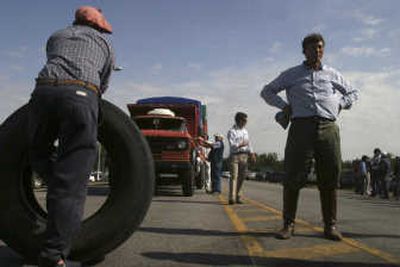Argentine farmers fight increases in export tax

BUENOS AIRES, Argentina – More than two years of tensions between Argentina’s government and the country’s powerful farm sector have exploded as farmers have set up roadblocks and refused to release their production to protest an export tax increase on some products.
On Tuesday, farmers had mounted some 150 roadblocks throughout Argentina, snarling traffic on some of the country’s principal highways. They also have refused to release much of their production, leading to shortages at markets.
The demonstrations, which will hit the two-week mark Thursday, target a new system of export taxes on soybeans and sunflowers that farmers say would bankrupt small- and medium-size farms. The new system also slightly lowered taxes on wheat and corn exports.
Government officials counter that farmers have earned record profits as international commodity prices have soared over the past two years and can afford to pay the higher taxes. The new system raises taxes when prices rise and reduces them when prices fall.
The new taxes now claim 40 percent of revenue from soybean exports, according to the Argentine Agrarian Federation. Soybean production is booming and accounts for nearly 60 percent of all land used in Argentina for agriculture.
Manufactured farm products and raw materials, which include agricultural products, constituted 64 percent of the country’s exports in January, according to government figures. Much of the country’s farm products go to China, Europe and the United States.
“There’s a threshold that’s been crossed and expectations that haven’t been met,” said Argentine political analyst Felipe Noguera. “The farmers feel like they haven’t been listened to, and it’s fed into this outburst of anger.”